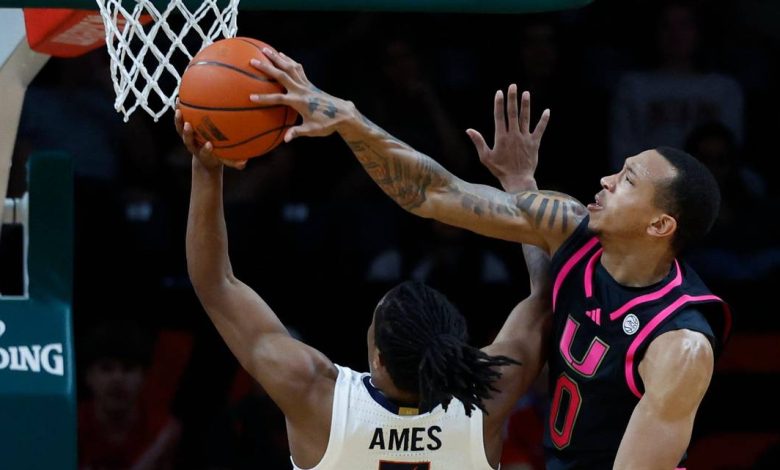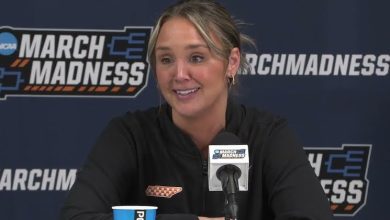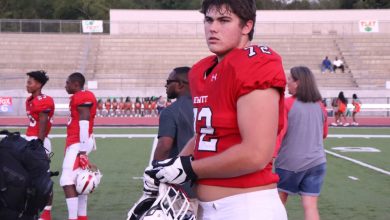Miami women’s basketball loses to Georgia Tech, ranked 20th, without making a full comeback.

In a high-stakes ACC matchup on a chilly winter afternoon, the Miami Hurricanes women’s basketball team found themselves facing a tough challenge: the No. 20-ranked Georgia Tech Yellow Jackets. Despite a spirited and determined effort, Miami ultimately fell short, unable to complete a late-game comeback that had the potential to turn the tide. The 72-63 loss was a difficult one for the Hurricanes, who showed flashes of brilliance but were ultimately unable to execute when it mattered most. For Georgia Tech, the victory was another important step in solidifying their place as one of the top teams in the conference, while Miami was left to reflect on what went wrong and what they could have done differently.
The High Stakes of the Matchup
For both teams, this game carried significant implications in the ACC standings. Georgia Tech entered the game ranked No. 20 in the country, enjoying a strong season under the leadership of head coach Nell Fortner. Their blend of tenacious defense and efficient offense had made them one of the most difficult teams to beat in the league, and they were poised to continue their climb in the rankings. On the other hand, Miami was looking to bounce back from a series of tough losses, hoping to remain competitive in the highly competitive ACC. A win over a ranked opponent like Georgia Tech would have been a significant morale booster and a valuable addition to their NCAA Tournament resume.
However, as the game unfolded, it became clear that Georgia Tech’s defensive prowess and efficient scoring would prove too much for the Hurricanes, despite a late surge that nearly brought them back into the contest.
A Strong Start for Georgia Tech
From the opening tip, Georgia Tech showcased their defensive intensity, which has been a hallmark of their success all season. The Yellow Jackets played aggressive, swarming defense that suffocated Miami’s offense. The Hurricanes were immediately forced into difficult shots, often contested and rushed. Miami’s leading scorer, Jasmyne Roberts, struggled to find her rhythm early on as she faced tight defensive pressure from Georgia Tech’s perimeter defenders.
Georgia Tech’s offense, on the other hand, appeared much more fluid. Led by senior guard Aaliyah Whiteside, the Yellow Jackets were able to move the ball effectively, finding open shots both inside and from beyond the arc. Whiteside, who has been one of the most consistent players for Georgia Tech all season, made her presence felt early, scoring 8 points in the first quarter alone. Miami had no answer for her playmaking ability, and Georgia Tech quickly built an 8-point lead, 18-10, by the end of the first quarter.
The first quarter demonstrated the contrasting styles of both teams: Georgia Tech’s methodical offense and stingy defense against Miami’s more up-tempo, aggressive style. Georgia Tech capitalized on Miami’s turnovers, which became a recurring issue for the Hurricanes throughout the game. Miami had 5 turnovers in the first quarter alone, which allowed Georgia Tech to convert those mistakes into easy points.
Miami’s Offensive Struggles
Throughout the first half, Miami’s offense continued to struggle against Georgia Tech’s pressure defense. The Hurricanes simply couldn’t generate any consistent scoring opportunities. Even when they were able to break Georgia Tech’s defense, they were often met with contested shots or forced to settle for lower-percentage attempts. The lack of ball movement and the absence of open looks stymied Miami’s offensive flow.
One of the few bright spots for Miami in the first half was senior forward Destiny Harden. Harden, known for her physicality and leadership, was Miami’s most consistent player offensively. She contributed 10 of Miami’s 28 first-half points, getting to the free-throw line and hitting mid-range jumpers. However, Harden’s individual efforts were not enough to overcome the larger team struggles.
The Miami coaching staff, led by head coach Katie Meier, tried to adjust by rotating different players in and out, looking for someone to spark the offense. But despite their best efforts, the Hurricanes’ shooting woes continued. They shot just 33% from the field in the first half and found themselves trailing 38-28 at the break.
A Strong Start to the Second Half: Miami’s Attempted Comeback
The second half began with Miami looking much more determined. The Hurricanes came out of the locker room with renewed energy, forcing Georgia Tech into turnovers and pushing the ball in transition. Jasmyne Roberts, who had been relatively quiet in the first half, began to assert herself more aggressively on offense. Roberts, Miami’s go-to player, started to find her rhythm, driving to the basket and drawing fouls. She also hit a key three-pointer midway through the third quarter, sparking the Hurricanes’ offensive resurgence.
With Roberts leading the charge, Miami went on a quick 6-0 run to trim the deficit to 5 points. The Hurricanes’ defense also tightened up, as they were able to disrupt Georgia Tech’s offensive flow with increased pressure and improved communication. Georgia Tech’s shots became more contested, and their offense stalled for a brief period. Miami’s momentum was building, and the home crowd was getting behind them as the game grew more competitive.
Head coach Katie Meier made a key substitution in the third quarter, bringing in freshman guard Haley Cavinder to provide a spark. Cavinder, known for her outside shooting, immediately made her presence felt by hitting a critical three-pointer that cut the lead to just 3 points. The Hurricanes’ defense also stepped up, forcing Georgia Tech into a series of tough shots and limiting their offensive rebounds.
As the third quarter came to a close, Miami had cut the Georgia Tech lead to just 4 points, 54-50. The game was within reach, and the Hurricanes were showing signs of life. However, the challenge of facing a ranked opponent like Georgia Tech was clear. Despite Miami’s best efforts, the Yellow Jackets were still able to execute their game plan and hold onto their lead.
Georgia Tech’s Poise and Execution Down the Stretch
As the fourth quarter began, Georgia Tech demonstrated why they are one of the top teams in the conference. The Yellow Jackets’ defense remained steadfast, denying Miami easy looks and forcing them into difficult shots. Aaliyah Whiteside continued to be a steady presence, scoring crucial points when Georgia Tech needed them most. Her ability to knock down mid-range jumpers and create scoring opportunities for her teammates kept the Hurricanes at bay.
Miami continued to fight, but every time they made a push, Georgia Tech had an answer. The Yellow Jackets were able to execute in the clutch, hitting free throws and getting key baskets from players like Lorela Cubaj, who added 10 points and 7 rebounds in the game. Cubaj’s presence in the paint helped Georgia Tech control the boards and limit Miami’s second-chance opportunities.
Despite a late three-pointer from Roberts and a couple of key defensive stops, Miami was unable to close the gap. The Hurricanes continued to struggle with their shooting, finishing the game at just 39% from the field. Georgia Tech, on the other hand, executed their game plan to perfection, controlling the tempo and preventing Miami from ever getting fully back into the game.
Post-Game Reflections: The Resilience of Miami
After the game, Coach Meier was proud of her team’s resilience but also acknowledged the areas that needed improvement. “We fought hard in the second half, and I’m proud of our effort to come back. But we just dug ourselves too deep of a hole early on,” she said in the post-game press conference. “Georgia Tech is a great team, and they made plays when they had to. For us, it’s about staying composed, minimizing turnovers, and executing better in critical moments.”
For Miami, the loss to Georgia Tech was a bitter one, but there were important lessons to be learned. The Hurricanes showed they could compete with one of the best teams in the country, but they also showed that consistency is key. Their inability to execute in the first half, compounded by their shooting struggles, ultimately led to their downfall. However, their second-half surge demonstrated that they have the potential to be a dangerous team when they put it all together.
Looking Ahead: The Road to the NCAA Tournament
Despite the loss, Miami remains in the hunt for a spot in the NCAA Tournament. With a few key games remaining on their schedule, the Hurricanes will look to build on the positives from the Georgia Tech game. Their ability to fight back against a ranked opponent and challenge them in the second half is a promising sign of their potential.
The key for Miami moving forward will be consistency—both in their offensive execution and in their ability to maintain defensive intensity for a full 40 minutes. Players like Jasmyne Roberts, Destiny Harden, and freshman Haley Cavinder will need to continue to step up as leaders, and the team as a whole will need to minimize turnovers and capitalize on every scoring opportunity.
For Georgia Tech, the win was another important step in their journey to an ACC title and a deep run in the NCAA Tournament. Their defensive play and ability to execute in crunch time were critical factors in the victory, and they will look to continue their strong play as the season progresses.
In the end, Miami’s inability to complete the comeback against Georgia Tech was a frustrating result, but it was also a testament to their resilience and determination. The Hurricanes will use this experience to learn, grow, and ultimately prepare for the challenges that lie ahead.









